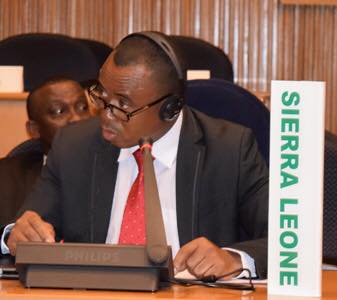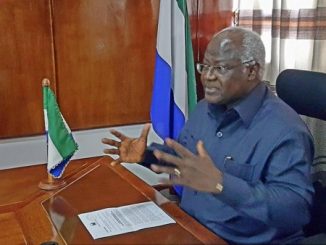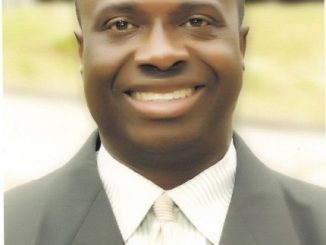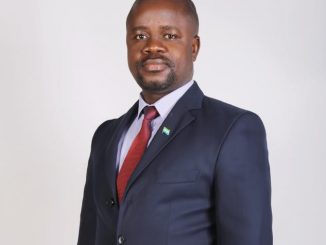
The issue of women, peace and security agenda took a centre stage during the Open Session convened by the African Union Peace and Security Council to debate on the ‘Role of the Media in Enhancing Accountability on Women, Peace and Security Commitments in Africa’ on Thursday 20th October, 2016 at the African Union headquarters in Addis Ababa.
In his presentation to the open debate, Sierra Leone’s erudite Ambassador to the Federal Democratic Republic of Ethiopia and Permanent Representative to the African Union, Mr. Osman Keh Kamara classically showcased His Excellency President Dr. Ernest Bai Koroma’s report card on how he has placed women in higher positions of trust and provided the space and the enabling environment for women’s continue participation in democratic governance across the country after years of war and political instability.
The multi accredited Ambassador described President Koroma as a gender passionate and affectionate leader who firmly believes in alternative views, which has led to the removal of barriers against women’s right in the country.
See below Ambassador Kamara’s inspirational presentation. Photo credit: Paschal Chem-Langhee (AUC).
Abdul Karim Koroma
Information Attaché
Embassy of the Republic of Sierra Leone
Addis Ababa
Ethiopia
Email: akk23222@gmail.com
Statement by Ambassador Osman Keh Kamara during the Open Session of the African Union Peace and Security Council on the ‘Role of the Media in Enhancing Accountability on Women, Peace and Security Commitments in Africa’, 20th October, 2016 at the
African Union Headquarters, Addis Ababa
Madam Chairperson,
My delegation would like to commend you for organizing this open session of the African Union Peace and Security Council (PSC) on the Role of the Media in Enhancing Accountability on Women, Peace, and Security Commitments in Africa. We would also like to express our appreciation to the Special Envoy on Women, Peace and Security of the Chairperson of the African Union Commission (AUC), UN Women Representative to Ethiopia, the African Union (AU) and the United Nations Economic Commission for Africa and media representatives for their excellent and comprehensive statements.
Mainstreaming women, peace and security commitments into all facets of human spheres for a peaceful and secured society was enunciated by the United Nations Security Council and enshrined in resolution 1325 which was unanimously adopted in 2000. This landmark legal and political framework acknowledges amongst others, the importance of the participation of women and the inclusion of gender perspectives in peace negotiations, humanitarian planning, peacekeeping operations, post-conflict peace-building and governance. In 2008, the United Nations Security Council also adopted Resolution 1820 which proscribes inter-alia the use of sexual violence as a tactic of war to achieve military and political ends. This resolution also identifies sexual violence as a matter of international peace and security that necessitates a security response. The African Union has reflected these resolutions into the AU Agenda 2063 and various Assembly and PSC Decisions. These global norms should not be viewed as mere package deals but are meant to be domesticated and implemented at the national and continental levels. The media by virtue of its wide audience could serve as a unique catalyst to enhance commitments to this noble agenda.
Madam Chairperson,
Significant progress has been made in the implementation of the women, peace and security agenda in Africa. The elections of two female presidents and several vice presidents on the continent, the appointment of a female Chairperson of the African Union Commission and four female Commissioners are excellent cases in point. We equally have several women in senior positions within the African Union Commission. This progress is cascaded within the regional organizations across the continent. Despite this progress, women still face several obstacles to leadership and political life. For instance, structural barriers through discriminatory laws in some countries invariably limit women’s options to run for elected offices irrespective of their proven abilities as leaders and agents of change and their rights to equal participation in democratic governance. More needs to be done in the areas of constitutional and legislative reforms to ensure women’s fair access to political spheres on the continent.
Women are excellent agents for conflict prevention and resolution. Evidence abound that long term conflict prevention requires investment in cultures of peace along with formal and informal institutions for non-violent conflict resolution. Women’s participation can provide a more comprehensive understanding of the root causes of and alternative solutions to conflict, and strengthen actions for addressing a range of needs for sustaining peace over time.
When conflict breaks out, both formal and informal negotiations and peace processes provide critical opportunities to reshape a country’s politics, security and broader socio-economic landscape. By including women, they expand the constituency contributing to conflict resolution, and create broader social buy-in to peace deals. This helps ensure that peace agreements are supported and sustained by nations as a whole. The UN Roster of Mediation Experts contains about 200 women peace and security experts from 25 countries including those in Africa. The expertise of these women should be utilized in the resolutions of ongoing conflicts in Africa.
At the national level, commitments to women peace and security agenda should be translated into national action plans, policies, institutions and budgetary allocations. Extensive media coverage of various aspects of governance can readily accelerate progress towards gender equality, bridge disconnects between national development strategies and gender equality plans; minimize gender inequality in public institutions, and possibly influence transparent gender responsive budgets that allocate equal resources for public financing of programmes that are related to both men and women. Of course, we appreciate the daunting task associated with media reporting on classified gender related governance issues. We believe that operating in a free and open media landscape equally comes with responsibilities. As long as facts relating to gender inequality are obtained and reported in compliance with existing national laws and global conventions, media houses and practitioners should not be shaken by threats of censorship, arrest and detention.
Madam Chairperson,
It is apparent from Sierra Leone’s experience that, sustainable peace cannot be achieved without the full and effective participation of women in conflict prevention, conflict resolution, peace processes, and post-conflict reconstruction and peace building. Pursuant to resolution 1941 adopted in 2010, the United Nations Security Council commended the Government of Sierra Leone for recognizing the important role of women in peace-building, in-line with resolutions 1325 and 1820 adopted in 2000 and 2008 respectively, by establishing national strategies relating to women, peace and security.
The Sierra Leone national action plan which was developed through a process that has been acclaimed by many as highly participatory and inclusive was launched by the President of Sierra Leone His Excellency Dr. Ernest Bai Koroma. This comprehensive plan includes a monitoring and evaluation framework to ensure that all actors are accountable for its full implementation. The launching of the national action plan was preceded by the launch of an overarching national gender strategic plan, with which the national action plan has been harmonized with a view to mainstreaming its implementation into the country’s development strategies.
Madam Chairperson,
Increasing the participation and representation of our women in peace and security programmes within a democratic governance structure is integral for the consolidation of peace and socio-economic development. To ensure that the role of women in the local Government machinery is enhanced, the Local Government Act provides for gender parity at the municipal level. We have also ensured a significant improvement in the participation of women in the security and justice sectors by appointing a number of women to senior management positions.
In 2008, for instance, the President of Sierra Leone made a landmark appointment – a woman was appointed as Chief Justice of the judiciary of Sierra Leone. Around the same period, nine judges and justices were also women. In 2009, the first female Brigadier in Sierra Leone – also the first in West Africa – was appointed. This appointment marked a major step towards the implementation of the equal opportunities policy adopted in 2009 by the Republic of Sierra Leone Armed Forces. The commitments of His Excellency President Dr. Ernest Bai Koroma to the women, peace and security agenda is also reflected in his Ministerial and Ambassadorial appointments.
Access to justice for our women has been reinforced through the enactment of the three gender-responsive laws: the Registration of Customary Marriage and Divorce Act, the Domestic Violence Act, and the Devolution of Estates Act. These laws were enacted to promote women’s rights and protect women against discrimination.
The illicit flow and use of small arms and light weapons during the 11-year rebel war was devastating, particularly for our women and girls. In this regard, the enactment of the National Commission on Small Arms Act of 2010 and the formal establishment of the National Commission for Small Arms were designed, among other things, to enhance our capacity to address the issue of violence, including gender-based and sexual violence. In addition to the existing national committee on gender-based violence entrusted to look into cases of abuse and violence against women and girls, pillar 3 of the Sierra Leone national action plan specifically deals with the prosecution and punishment of perpetrators as a way of addressing the question of impunity for sexual and gender-based violence.
Among other impressive strides taken by the Government of Sierra Leone to improve the welfare of our women and girls are affirmative action for girl-child education and the adoption and implementation of the free health care delivery initiative for pregnant women, lactating mothers and children under the age of five.
To conclude Madam Chairperson, the contributions of women in conflict prevention, mediation, negotiation and peace-building across the continent should be given sufficient recognition. Very little media coverage is given to women’s contribution to peace and security. Invariably, women are portrayed as refugees and victims’ of sexual violence in conflict situations. However, efforts should also be made to give visibility to the formal and informal contributions of women in conflict prevention, peace-building and socio-economic development. We commend the Special Envoy on Women, Peace and Security of the Chairperson of the AUC and UN Women for organizing a workshop to train a network of African peace journalists and peace reporters on gender-responsive reporting in conflict and post-conflict situations. We encourage media houses in Africa particularly the print media to appoint more female journalists in senior editorial positions to enable them make independent decisions on gender-responsive reporting.
I thank you for your kind attention.



